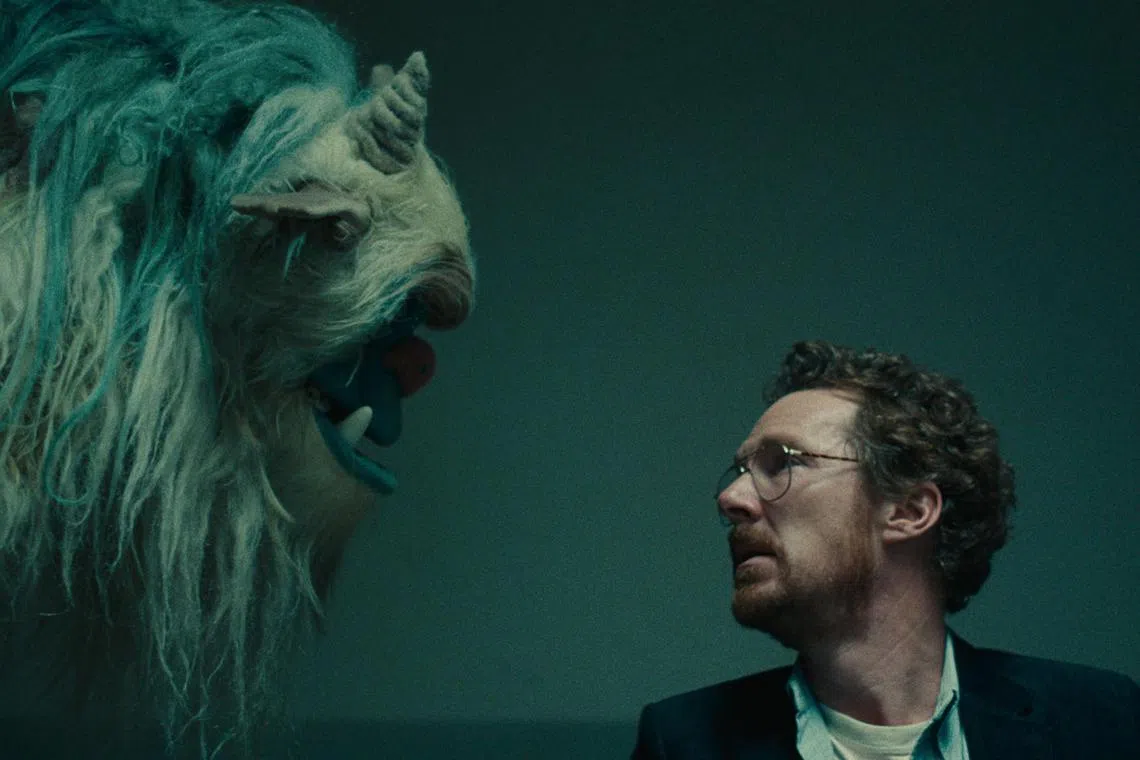Binge-worthy: Benedict Cumberbatch’s Eric is a missing-child mystery set in a city on fire
Sign up now: Get ST's newsletters delivered to your inbox

Benedict Cumberbatch (right) stars in Eric as a gifted puppeteer whose son is abducted.
PHOTO: NETFLIX
Follow topic:
Eric (M18)
Netflix 4 stars
The six-part Netflix miniseries Eric finds Benedict Cumberbatch in his sweet spot.
The British actor plays a tormented genius, the kind of role that has earned him a slew of Oscar and Bafta acting nominations – for playing mathematician Alan Turing in biographical thriller film The Imitation Game (2014) and the title role in the detective series Sherlock (2010-2017).
In Eric’s story set in 1985, Cumberbatch plays Vincent, a father drowning in guilt and regret. The gifted puppeteer behind the hit kids’ show Good Day, Sunshine! – a fictional version of Sesame Street – has a nine-year-old son, Edgar (Ivan Morris Howe).
After the boy is abducted off the streets near his New York home, Vincent and wife Cassie (Gaby Hoffman) are thrown into a nightmare that encompasses the city they call home, its political establishment, police system and class structure.
Here is why this psychological drama is worthy of a binge.
1. Just weird enough
Eric’s creator, Welsh screenwriter Abi Morgan, will be familiar to those who have enjoyed her film screenplays for the Margaret Thatcher biopic The Iron Lady (2011) and psychological drama Shame (2011).
An idea that runs through her work is the notion of the manufactured image, the front that is put up by people ashamed of revealing their true selves. In The Iron Lady, before she rises up the party ranks to eventually become Britain’s Prime Minister, a younger Thatcher (Meryl Streep) gets coaching to rid herself of her middle-class speech patterns.
The beloved children’s entertainer Vincent is in real life anything but sunny towards his son or wife. After Edgar is taken, the distraught dad is obsessed with the idea of making a new puppet, a lumbering shaggy-haired monster called Eric. In the coming days, Eric becomes real to Vincent, even if no one else can see him.
When Vincent talks to Eric, audiences know what he is thinking, but the image of a man and a monster working to solve a mystery adds a welcome touch of strangeness to an otherwise straightforward crime drama.
2. The pain of losing a child
Missing-children dramas are a peculiar sub-genre of crime mystery. There is an acuteness to the sense of loss that needs to be shown on screen, or else the story will feel hollow and manipulative. Grief is as important as the crime-solving mechanics.
The evocation of pain gave Canadian director Denis Villeneuve’s Prisoners (2013) a hard-hitting punch – the father’s (Hugh Jackman) grief-motivated actions became part of the story.
This series honours the parental suffering as well, through well-constructed scenes that allow for a range of emotions to be aired. There is the initial horror when the news of the missing child breaks, but the follow-ups are equally important, when the missing persons detective Michael Ledroit (McKinley Belcher III) comes back with more bad news.
3. The bones of the city laid bare
Hollywood auteur Woody Allen’s 1970s comedies such as Annie Hall (1977) and Manhattan (1979) gave New York City a romantic sheen. But the decade that followed will be remembered as a time of its greatest moral and social decline, as seen in films like The Bonfire Of The Vanities (1990) and Wall Street (1987).
It was the decade when the crack cocaine epidemic was at its height, when street crime, homelessness, racial politics and police corruption were cemented into the city’s identity. Meanwhile, its titans ran everything like feudal princes.
Fans of HBO crime series The Wire (2002 to 2008) will enjoy the way Edgar’s disappearance ripples through New York City’s strata, from the homeless on the streets to the show-business community to the mayor’s office – Edgar is white and missing in a city that has ignored the disappearance of black children.


